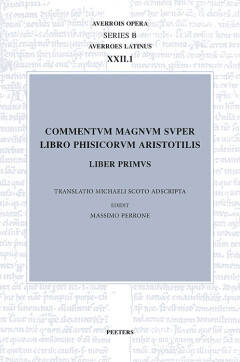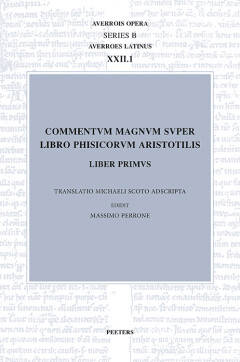
- Afhalen na 1 uur in een winkel met voorraad
- Gratis thuislevering in België vanaf € 30
- Ruim aanbod met 7 miljoen producten
- Afhalen na 1 uur in een winkel met voorraad
- Gratis thuislevering in België vanaf € 30
- Ruim aanbod met 7 miljoen producten
Zoeken
Commentum Magnum Super Libro Phisicorum Aristotilis. Liber Primus
Translatio Michaeli Scoto Adscripta
M Perrone
€ 195,45
+ 390 punten
Omschrijving
Ibn Rusd (1126-1198), commonly known in the Middle Ages as Averroes, commented on all the major works of Aristotle and profoundly influenced later Medieval and Renaissance philosophy. Notably, he wrote three works on the Physics: the Short, Middle, and Long Commentary. While only the Short Commentary survives in Arabic, the Middle and the Long Commentaries are preserved in Latin and Hebrew translations. Although Aristotle's Physics had already been translated from Greek into Latin by James of Venice (12th century) and from Arabic by Gerard of Cremona (ca. 1114-1187), the new translation from Arabic accompanied by Averroes's commentary gained wider circulation, as evidenced by the large number of manuscripts. This translation, which is generally attributed to Michael Scot (ca. 1175-1235), was likely produced at the court of Frederick II (1194-1250).
Specificaties
Betrokkenen
- Auteur(s):
- Uitgeverij:
Inhoud
- Aantal bladzijden:
- 357
- Taal:
- Engels
- Reeks:
Eigenschappen
- Productcode (EAN):
- 9789042954793
- Verschijningsdatum:
- 18/08/2025
- Uitvoering:
- Hardcover
- Formaat:
- Genaaid
- Afmetingen:
- 165 mm x 240 mm
- Gewicht:
- 231 g

Alleen bij Standaard Boekhandel
+ 390 punten op je klantenkaart van Standaard Boekhandel
Beoordelingen
We publiceren alleen reviews die voldoen aan de voorwaarden voor reviews. Bekijk onze voorwaarden voor reviews.








